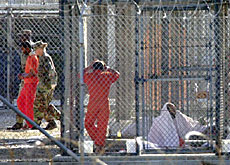
UN accused of failing human rights victims

Swiss and international non-governmental organisations (NGOs) have slammed the United Nations’ top human rights body for “perpetuating a consensus of silence”.
The UN Human Rights Commission (UNHRC) wrapped up its 60th annual session in Geneva on Friday, amid criticism that it was too soft on governments that abuse human rights.
“The commission has moved away from naming and shaming countries in favour of providing violators with technical assistance and that’s very negative,” said Adrien-Claude Zoller, the president of the NGO, Geneva for Human Rights.
“This body has a mandate to denounce flagrant human rights abuses around the world, but the majority of states are only interested in protecting themselves,” he told swissinfo.
Disappointment
Zoller added his voice to a chorus of criticism – from groups like Amnesty International and Human Rights Watch – that the commission neglected to address abuses in Iraq and Guantanamo Bay, Cuba.
The UN body was also taken to task for failing to adopt resolutions on human rights violations in China and Sudan. And it was criticised for failing to condemn discrimination towards sexual minorities, including homosexuals.
“The UN’s main human rights body has demonstrated an incapacity and unwillingness to address serious human rights violations,” said Amnesty’s representative to the UN in Geneva, Peter Splinter.
“We’re really rather disappointed by the overall outcome of this year’s commission,” he added.
Swiss stance
The head of Switzerland’s observer delegation to the commission, Jean-Daniel Vigny, agreed that political manoeuvring had led “the majority of member states” to take a soft stance on several critical issues.
“I understand and share the NGOs’ criticism on many issues, including Guantanamo, China and Sudan,” Vigny told swissinfo. “The majority of the commission failed on these topics… but you have to be pragmatic and understand that human rights are political.”
He was also quick to point out that the UNHRC had succeeded in passing a resolution on the elimination of violence against women and a chairperson’s statement on the human rights situation in Nepal – two issues that Switzerland had lobbied hard for over the past six weeks.
Success
“We had hoped to see a resolution on Nepal and we didn’t get that,” Vigny said. “But thanks to our work and our allies’ support, we were able to offer technical assistance to Nepal… and that’s a success.
“Overall, we really feel that we were able to make our voices heard and that our work will increase our chances of being elected to the commission in the future,” he added.
Despite his overall criticism of the UNHRC’s work, Zoller agreed that Switzerland deserved praise for its contribution this year.
“If all the delegations [had] the same attitude towards human rights issues as Switzerland, then it would be a very different commission,” Zoller said.
Iraq
For their part, the NGOs also acknowledged that this year’s session resulted in “a few successes”, including the adoption of a code of conduct outlining the responsibilities of transnational corporations to uphold human rights.
But they insisted that the commission’s credibility had been undermined by its reluctance to take a tougher stance on individual countries and sensitive issues.
“Iraq didn’t even make it to the commission’s agenda,” said Splinter.
“There was no draft resolution… nothing, and that’s difficult to imagine when we think about the situation that prevails in Iraq today.”
swissinfo, Anna Nelson at the UNHRC in Geneva
The United Nations Commission for Human Rights ended its 60th annual session in Geneva on Friday.
Each spring, the commission meets during a six-week period to examine the human rights situation in countries around the world.
This year, its 53 rotating member states also discussed several thematic issues, including human rights and counter-terrorism, the death penalty and violence against women.
Switzerland, which hopes to become a full-member of the commission by 2007, contributes annually to around 100 resolutions as an observer state.

In compliance with the JTI standards
More: SWI swissinfo.ch certified by the Journalism Trust Initiative

























You can find an overview of ongoing debates with our journalists here . Please join us!
If you want to start a conversation about a topic raised in this article or want to report factual errors, email us at english@swissinfo.ch.